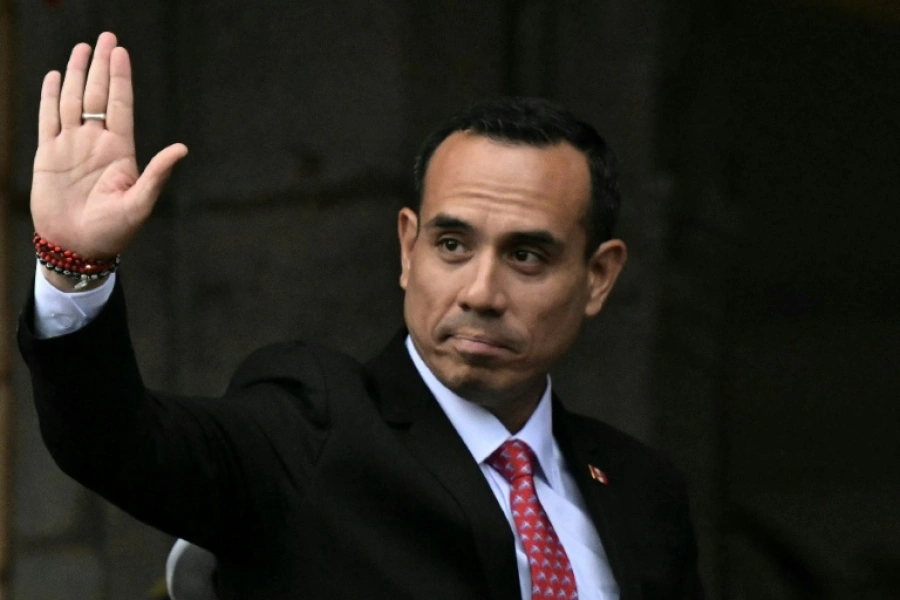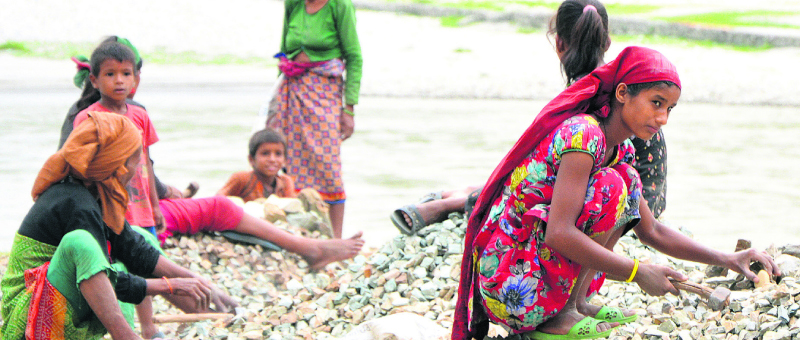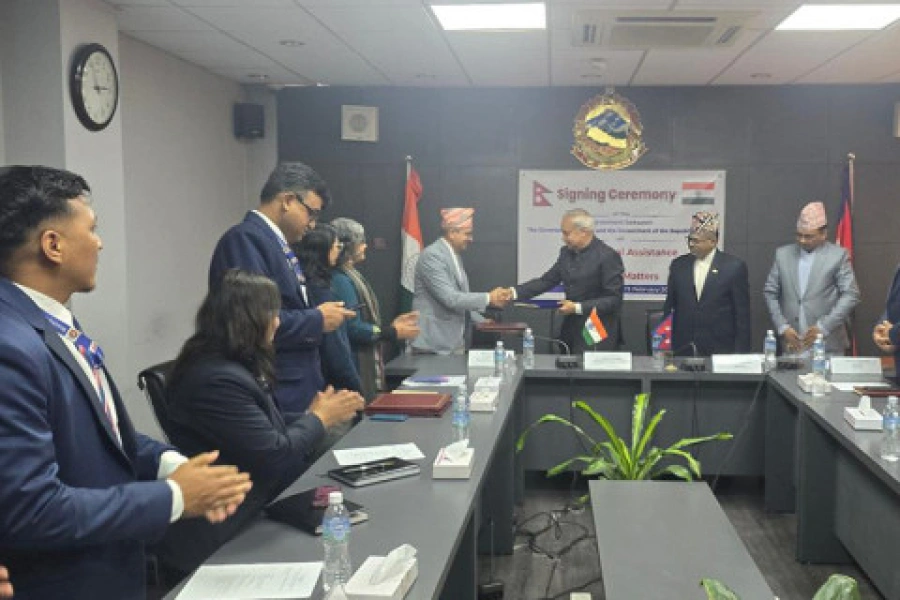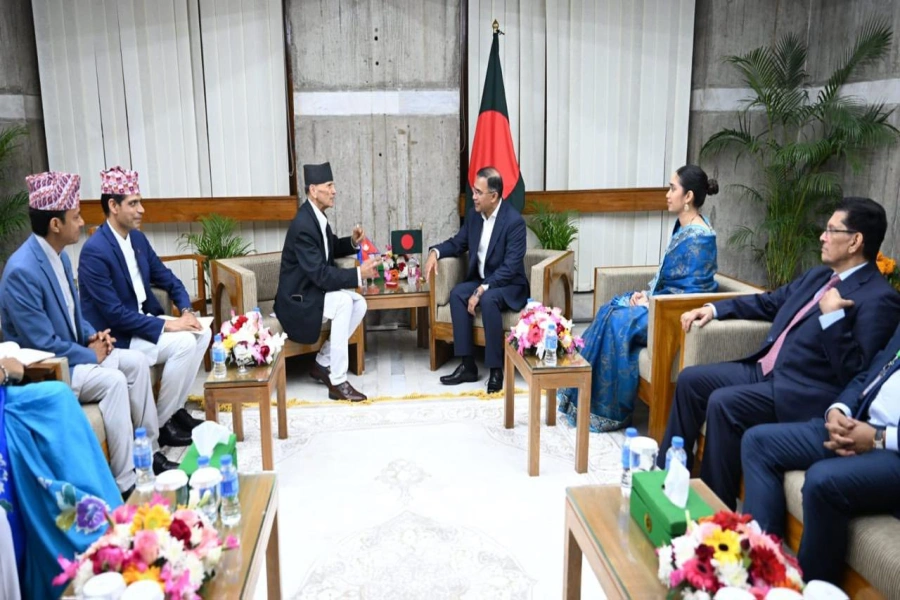Nepal is observing 16 Days of Activism Against Gender-Based Violence (GBV), a global campaign from November 25 to December 10, aimed at addressing systemic violence and inequality. This year’s theme, “Our Commitment: Solidarity for Ending GBV,” resonates in a country where structural barriers and cultural resistance continue to marginalize women, Dalits, and LGBTQIA+ individuals. While the 2015 Constitution guarantees equality and prohibits discrimination, practices like dowry-related violence in the Tarai, Chhaupadi (the isolation of menstruating women), early marriage/child marriage, human trafficking, and exclusion from property rights persist among others.
Globally, 736 million women have experienced violence, a reflection of pervasive gender inequality. Nepal mirrors this trend: the Nepal Demographic Health Survey (2016) reported that one in three women aged 15–49 had faced physical or sexual violence. Over 21,568 cases of GBV were documented between July 2023 and July 2024. Harmful traditions like Chhaupadi and child marriage remain entrenched, especially in regions like Sudurpachhim, Karnali, and the Tarai, despite legal prohibitions. LGBTQIA+ individuals also face systemic exclusion, from employment and education to healthcare and inheritance rights, highlighting gaps in the implementation of constitutional protections.
Sita’s(name changed) story, as narrated by Meena Paudel’s article, “Opinion: The Confidence Gained through Labor Migration,” published in Kantipur Daily on Mangsir 11, 2081, is representative of these systemic failures. Born into a Dalit family in the Tarai, Sita was forced into child labor at the age of 10 to settle her family’s debt to a moneylender. Her plight underscores how caste, economic vulnerability, and weak enforcement perpetuate inequality. LGBTQIA+ individuals face similar struggles, often excluded from legal and social systems due to cultural norms and biases.
Intersecting Inequalities: Gender, Caste, and Sexuality
Nepal’s Constitution prohibits discrimination based on caste, gender, and sexual identity, yet these protections are undermined by societal norms that reinforce patriarchal and caste-based hierarchies. Tarai, a harmful dowry practice, subjects women to economic exploitation and abuse, while Chhaupadi continues to endanger the health and safety of menstruating women in Sudurpachhim and Karnali. LGBTQIA+ individuals face compounded exclusion due to cultural stigma and legal ambiguity, which restrict their access to public resources and civil rights.
Dr. B.R. Ambedkar’s critique of caste as a “lawless law” aptly describes the situation in Nepal, where informal customs often hold more sway than formal legal protections. Ambedkar noted:“Custom is enforced by people far more effectively than law is by the state” (Narain, 2017, p. 4).
This observation is evident in rural areas, where caste determines access to education, employment, and justice. Dalit women, for instance, face intersecting oppressions due to their caste, gender, and economic status. LGBTQIA+ individuals experience similar systemic exclusion, compounded by heteronormative biases that deny their existence in mainstream legal and cultural frameworks.
Innovative take on gender equality

Katherine O’Donovan’s critique of traditional legal systems highlights their failure to address intersectionality, where overlapping identities exacerbate marginalization. She writes: "Equality legislation often fails to process claims of unequal treatment where sexes or social positions differ” (O’Donovan, 1989, p. 131).
Nepal’s gender-neutral and caste-neutral laws often overlook the compounded disadvantages faced by marginalized groups, such as Dalit LGBTQIA+ individuals, who remain doubly excluded from economic and social opportunities. Additionally, Marie Mercat-Bruns’ analysis of indirect discrimination reveals how apparently neutral laws can perpetuate systemic exclusion. For example, LGBTQIA+ individuals are often denied property inheritance because laws prioritize heteronormative family structures. Similarly, women from marginalized communities face barriers in accessing justice due to pervasive biases within law enforcement and judicial systems.
Trafficking, Polygamy, and Labor Exploitation
Trafficking under the guise of foreign employment remains a significant challenge in Nepal, particularly for women and LGBTQIA+ individuals from economically vulnerable regions like the Tarai and Sudurpachhim. Traffickers exploit the desperation of families by offering false promises of lucrative opportunities abroad. Once trafficked, victims face coercion, abuse, and unsafe working conditions. LGBTQIA+ individuals, excluded from traditional labor markets due to societal stigma, are at heightened risk of exploitation.
Polygamy, though illegal, persists in many rural areas where patriarchal norms dominate family structures. Women in polygamous marriages often face neglect, abuse, and exclusion from property rights. LGBTQIA+ individuals face additional challenges, as the lack of legal recognition for non-heteronormative partnerships denies them basic protections like inheritance and spousal rights, despite the Supreme Court's ruling.
Labor migration, while offering economic opportunities, also exposes women and LGBTQIA+ individuals to significant risks. Many women returning from foreign employment face reintegration challenges, including stigma and limited access to support systems.
LGBTQIA+ individuals often migrate to escape discrimination at home but encounter similar exclusion and exploitation in host countries. Strengthening labor migration policies to include safeguards for LGBTQIA+ individuals is essential to ensure equitable economic empowerment.
Global and Local Frameworks for Change
The 16 Days of Activism Against GBV and the International Day for the Elimination of Violence Against Women (IDEVAW) provide critical platforms for advocating systemic change. Globally, the United Nations emphasizes the importance of addressing GBV through prevention, survivor support, and accountability mechanisms. These principles align with Nepal’s need for targeted interventions that address both structural inequalities and cultural resistance to change.
Reviving grassroots mechanisms like Para Legal Committees (PLCs) is essential for addressing the needs of marginalized communities. These committees, which played a key role in mediating GBV cases before their dissolution, could provide crucial support for survivors, particularly Dalit women and LGBTQIA+ individuals. Strengthening local governance structures to address cases of trafficking, dowry-related violence, and property disputes is equally important.
Educational campaigns must prioritize marginalized groups, addressing harmful practices like dowry, Chhaupadi, and child marriage while fostering societal acceptance of diverse identities and relationships. These programs should include LGBTQIA+ perspectives to ensure comprehensive reform.
Nepal’s judiciary must proactively address systemic discrimination by recognizing cases of indirect discrimination and establishing legal precedents that account for intersectionality. Inclusive policies should extend to labor migration, ensuring protections for LGBTQIA+ individuals against exploitation and providing legal and consular support for migrant workers.
A Call for Inclusive Justice
To break cycles of inequality, Nepal must integrate legal reforms, cultural transformation, and survivor-centered approaches. Dr. Ambedkar’s vision of constitutional morality, emphasizing fraternity, liberty, and equality, offers a guiding principle for these efforts. While Nepal’s Constitution embodies these ideals, their realization requires sustained commitment to enforcement, education, and inclusivity.
Globally, campaigns like the 16 Days of Activism Against GBV provide valuable momentum, but localized efforts tailored to Nepal’s unique challenges are essential. Addressing caste-based exclusion, LGBTQIA+ discrimination, and gender inequality requires collective action at all levels of society.
The legal maxim “Fiat justitia ruat caelum”—let justice be done though the heavens fall—serves as a powerful reminder of the unwavering commitment required to uphold justice. Similarly, the Nepali adage “Sabaiko adhikar, sabaiko samman” (rights and respect for all) emphasizes the importance of inclusivity and equity. By integrating these principles into its legal and social systems, Nepal can create a society where dignity, fairness, and equal opportunity are guaranteed to every citizen.







































